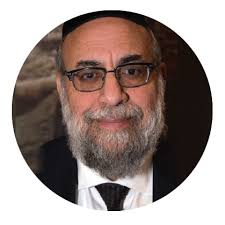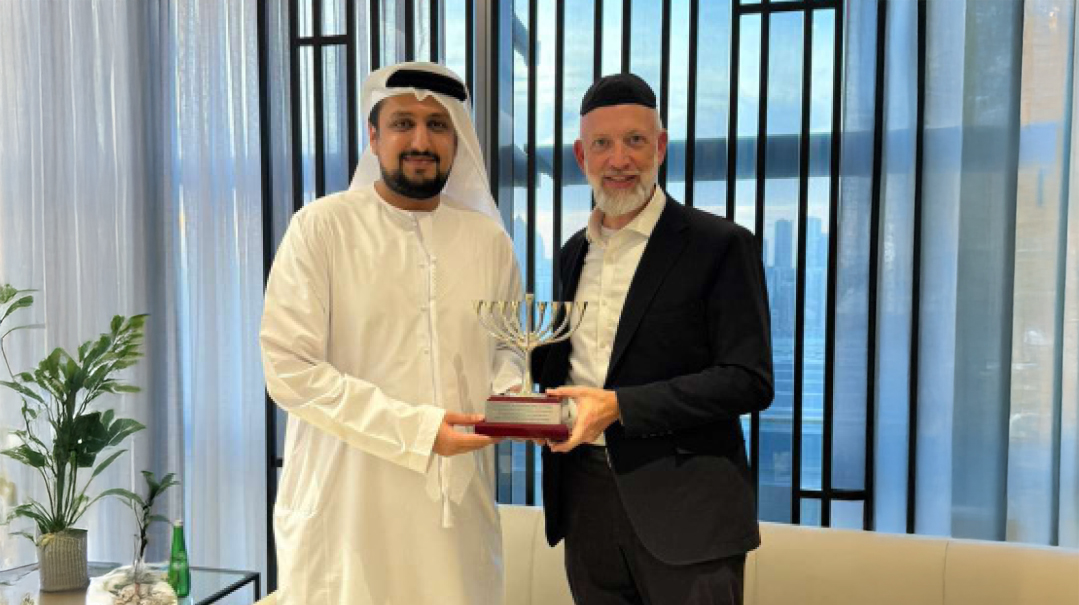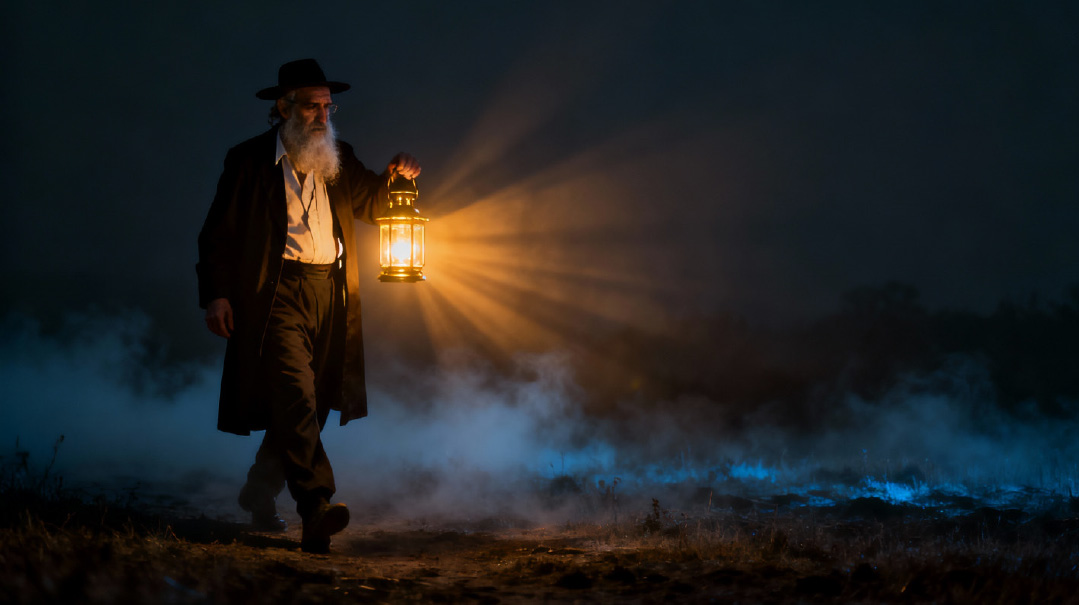The Real Abraham Accords

The real Abraham Accords — the covenant founded by our forefather, Avraham Avinu himself

When the first Trump administration inaugurated the Abraham Accords, we watched the signing ceremony with incredible excitement and great hopes, with some even saying we were experiencing Ikvesa D’Meshicha.
Our hopes for peace were totally shattered when instead, the soil of Eretz Yisrael was once again soaked with the blood of our people.
Then the impossible happened (again). Despite being vilified, convicted, pursued by every agency in the country, state, and city, Trump was reelected by a landslide. The Abraham Accords were given a new lease on life. The biggest question now is whether Saudi Arabia will join or not. No one can realistically answer that one, nor should anyone even waste time trying to, especially those of us who really have no part in this anyway.
Permit me to explain.
While the umos ha’olam are busy with the Abraham Accords, we in Klal Yisrael, maaminim bnei maaminim, have long belonged to the real Abraham Accords — the covenant founded by our forefather, Avraham Avinu himself.
The Mishnah in Pirkei Avos (3:15) warns us against nullifying the Bris (loosely translated as “accords”) of Avraham Avinu. Later in Pirkei Avos (5:22), the Mishnah instructs us to emulate three positive character traits that Avraham Avinu himself manifested: having an ayin tovah (a good eye), a ruach nemuchah (humble spirit), and a nefesh sichlah (undemanding soul). These three attributes connect us to our founding father and bind us all in the real Abraham Accords.
The Mishnah doesn’t say we should all vote for Agudah, or Mizrachi, or Eretz Hakodesh. It doesn’t say we should all say Hallel on Yom Ha’atzmaut or continue with Tachanun as on a regular day. It doesn’t require us to live in Lakewood, Jackson, Toms River, or the shtetlach of Kiyas Yoel, Skver, or Brooklyn. It doesn’t say we should be fighting in Gaza or learning in Brisk. To be members in good faith in the real Abraham Accords, we only need an ayin tovah, a ruach nemuchah, and a nefesh sichlah.
Having just concluded 49 days of introspection and baruch Hashem renewed our spiritual energies with Kabbalas HaTorah, it behooves us to how we are doing in these three critical areas. As the calendar rapidly flips through to Tammuz and Av, and soon after, the Yamim Noraim — how will Hashem find that we are doing, collectively and individually, in emulating Avraham Avinu?
I would like to suggest that while only the Borei Olam knows what is in an individual’s heart, on the collective level, it’s still very much a work in progress.
Here I want to share some heartfelt thoughts the need to treat each other with more love and respect — but also how to do so. This theme has been discussed in these pages before, but the need is now that much greater.
At the recent incredible Adirei Torah event (a topic for another time) I met an old friend, a very distinguished rav, who asked me why he hadn’t seen any articles by me lately. I shared that I was actually writing the piece you’re reading now, on the topic of how to focus on treating other Yidden properly, particularly the ones who have a different hashkafah.
“Rabbi Ginzberg,” he said, “your articles are often thought-provoking and important for a community always looking to grow. But on this topic, you’re wasting your efforts. We’re all so entrenched in our positions that no one is willing to listen to another viewpoint anymore.”
After we parted, I thought to myself, Maybe this very wise person is right and I really am wasting my efforts. I looked around the massive event and saw more than 30,000 strong, likeminded people, all committed to a complete Torah way of life, and wondered of there really is no room for anyone with a different mindset in our orbit. I actually thought of deleting everything I had written.
Just a few days later, the war began. Everything suddenly changed. The rapid pace of events —the first bombs being dropped all over Iran, the assassinations of key players in the satanic regime, the missiles flying in every direction — has changed us not only for the moment, but forever. It is way too early to fathom the undeniable hashgachas haBorei at every turn, with planes still in the air and Yidden still huddling in their mamads with their loved ones. There will be time for that, just not yet.
However, we can already point to one fundamental change. In the midst of all the planes and missiles, we can suddenly perceive the absence of protest and machlokes. No longer are there hundreds of thousands of Yidden from the right or the left calling for someone’s downfall, or young yeshivah bochurim blocking buses and cars from going about their business. There are no public displays of hatred for the chareidim or from the chareidim for others.
There is overwhelming love and concern for soldiers and Yidden on the street. Kindness has replaced apathy and indifference. Will this amity be short-lived? Most probably. But together with Avinu shebaShamayim, let us relish it for the moment. And just maybe my wise friend who felt I was wasting my effort would now agree that maybe the right words, expressed from the heart, will find receptive ears and open minds. So here goes.
In the midst of the frightening Tochachah in parshas Bechukosai, the Torah inserts a pasuk (Vayikra 26:42) telling us that Hashem will remember the Bris of the Avos. Most of the Rishonim understand this pasuk as the nechamah, the consolation after the frightening words of the Tochachah.
However, the Shelah Hakadosh explains that this is actually part of the Tochachah: “Don’t try to find excuses for your behavior, because I remember the righteous ways of the Avos.” The Dubna Maggid similarly explains that Hashem, in the middle of His admonition to Klal Yisrael, says, “I will hold you accountable for your actions, because you didn’t live up to the legacy of such forefathers.”
We were, we are, and we always will be eternal members of the real Abraham Accords.
IT is our national responsibility is to treat each other, those we agree with and those whom we do not, with the respect and dignity due to every child of Avraham Avinu. In Tanna d’Bei Eliyahu, Chazal teach us that Hashem says, “My children, am I asking such a difficult thing of you? All I ask is that you honor and love one another.”
This means that even if we have fundamental differences in hashkafas haTorah with another Yid, and the obligation to address those differences necessitates measures that may go beyond what is normally acceptable to protect the greater communal well-being, there are nevertheless certain guidelines that must still be followed.
We find a fascinating insight in the Targum Yonasan in parshas Emor on this topic. The Targum notes four times when Moshe Rabbeinu was asked a sh’eilah for which he didn’t have an answer and he had to ask Hashem for direction. On two of the questions — from Bnos Tzelafchad, and about Pesach Sheini — Moshe asked Hashem immediately. However, on the other two questions — regarding punishments for the one who cursed Hashem and for the mekoshesh eitzim — he incarcerated the wrongdoers and waited until the next day to ask Hashem for direction.
The reason for this, explains the Targum Yonasan, is that unlike questions in halachah, which should be resolved as quick as possible, questions in dinei nefashos, life and death issues, require deliberation. One should not rush to resolve the question, but rather sleep on it overnight.
The Chachmei Mussar have difficulty with this idea. This would make sense if the question were put to a human being, who needed to spend the night contemplating all aspects of the sh’eilah to reach a decision. However, in these cases, Moshe didn’t know the halachah and was planning to ask HaKadosh Baruch Hu for the answer. Why would Moshe need to wait until the next day? HaKadosh Baruch Hu surely doesn’t need time to render a decision!
The Chachmei Mussar explain this with a fundamental understanding of the laws of dinei nefashos. The need for delay is not due to any uncertainty as to the correct halachah. The requirement to wait until the next day applies even when the halachah is as clear as day. It is there because each and every Yid is valuable to this world and to Klal Yisrael, even if he is deserving of capital punishment; therefore, one should take the night to contemplate this person’s fate, even when HaKadosh Baruch Hu will render the entire decision Himself.
When kevod Shamayim is in question, sometimes even drastic action needs to be taken against another Yid — but that determination can only be made by someone of the caliber of the Chofetz Chaim.
Rav Shimon Schwab related one such example. When he served as a rav in Baltimore before the war, many gedolim would come visit him. In 1938, the illustrious rosh yeshivah Rav Elchonon Wasserman Hy”d arrived for a fundraising trip for his yeshivah in Baranovich. He shared with Rav Schwab the following fascinating background to a world event that no one seemed to understand.
Leon Trotsky was one of the founders of the Soviet Union and a close confidant of Lenin. After Lenin died, Joseph Stalin took power, though Trotsky remained widely popular. Stalin soon began to resent Trotsky and issued him an ultimatum: either total obedience to him or exile. Trotsky chose exile. Historians were perplexed as to how such a powerful figure could be so quickly reduced to a nobody.
Rav Elchonon gave Rav Schwab the backstory. When Trotsky was still in authority, issuing decrees against Torah and Yiddishkeit, the Chofetz Chaim took it upon himself to destroy him. The Chofetz Chaim summoned Rav Elchonon by telegram. Upon his arrival, the Chofetz Chaim advised him that he had decided to issue a cherem against Trotsky.
He explained to Rav Elchonon, “We have no power over the non-Jews, but Trotsky is a Jew. In Warsaw, I was able to find out his Jewish name and his mother’s name. We have the ability to foil his deeds.”
Rav Elchonon related that a minyan was called together late at night at a local shul. They lit candles, took out the sifrei Torah from the aron, blew a shofar, and the Chofetz Chaim issued a cherem against Trotsky.
From then on, Rav Elchonon related, Trotsky’s star began to fall. Rav Elchonon had explained what the historians could not. (Another source, a sefer called Bishvilei Radin, adds on page 226 that the Chofetz Chaim also asked Rav Chaim Ozer to join him in making the cherem, but this is not found in the version in Ohr Elchonon.)
This story shows that when extreme measures need to be taken to defend kevod Shamayim, a “Chofetz Chaim” is needed to make the call. Nowhere do we find license for an individual (with semichah or without) to critique a Yid whose Torah scholarship is uncontested. This is especially sinful when done on a public blog, where any mean-spirited commentor with a computer can add his own words of disrespect. No one is spared, not even a nonagenarian who spent most of those years in the four walls of the beis medrash.
Although we’ve become accustomed to crude discourse from public figures, such as “taking the entire chareidi community in a wheelbarrow to the garbage dump,” or “strangle him with his tefillin,” this doesn’t make mockery within our own community against the ziknei hador any less disturbing. Such disrespect does not go unnoticed by the Dayan HaEmes.
But when those who make unbecoming remarks are called out on it, they always give the same response: It’s a machlokes l’Sheim Shamayim. And with that, all is forgiven. Or is it?
The Ponevezher Rosh Yeshivah, Rav Shach, shared an incredible thought with me almost five decades ago that I have never forgotten. The Midrash in Bereishis Rabbah describes the disagreement between Kayin and Hevel. They sat down to divide up the world, each taking half. When they came to the place where the Beis Hamikdash would ultimately be built, each one said B’techumi, “In my portion.” They began to argue over it, and then Kayin stood up and killed Hevel.
Rav Shach asked how is it possible that the argument over whose portion would host the Beis Hamikdash could lead to murder. He explained that an argument about the Beis Hamikdash itself would never have led to murder. However, the argument was about B’techumi, “In my portion.” When the argument is all about what’s “mine,” it inevitably leads to murder.
When arguments between Yidden become degrading and offensive, it’s no longer about kevod Shamayim, but about “my kavod.” Yes, that can even lead to retzichas damim. Before we take pen in hand to send off a response that attacks another Yid, especially a senior gadol, we need to consult with someone the likes of the Chofetz Chaim to determine if that is appropriate. If that’s not feasible, then let’s take out the Pirkei Avos and remind ourselves of the three requirements for membership in the real Abraham Accords before we click send.
A case in point: Jews everywhere were enraged and horrified to see the video of the Arab teenager spitting on a woman soldier on the bus. We were thrilled when he was caught, arrested, and sent to prison like the terrorist that he is.
Why didn’t we have the same feelings of rage and horror over another viral video from just one day earlier? At a protest in the center of Yerushalayim by young yeshivah bochurim against the impending draft, a young bochur, 11 or 12 years old, with peyos and tzitzis flying, was seen berating a frum woman with covered hair. He spat in her face and called her a derogatory name. When she protested, he spat at her a second time.
Although this was unfortunately not an isolated incident, it was extremely painful to watch. Most painful was the lack of outrage from the many Yidden who watched it. We have become so desensitized to these types of things. Some may even consider this to be the new normal. It just cannot be.
The Arab was just doing what he was trained to do; it’s what a pere adam does. We, however, are required to follow the three rules for members of the real Abraham Accords. Isn’t that how we are supposed to be raising the next generation?
When I was in Eretz Yisrael a few months ago, a friend shared with me a precious insight that he had heard from one of the yakirei Yerushalayim in the name of the Vilna Gaon. (I would be indebted to anyone who knows the source of this insight; I have not been able to find it.)
Rashi in the beginning of parshas Vayeitzei quotes from Chazal that Yaakov Avinu gathered 12 stones as he prepared to lie down for the night. The 12 stones fought over the zechus to support Yaakov’s head while he slept. A miracle happened and they all merged into one large stone.
The question is asked: If Hashem is already performing a miracle for Yaakov Avinu, why not turn the stones into a soft pillow, instead of one large stone?
The Vilna Gaon’s insight that my friend shared is that whatever begins as a machlokes can at best turn into only a big stone. A pillow, it will never become.
After hearing this idea, I was thinking that over the last year and a half, we have seen so many miracles in the course of this war. But if Hashem is already performing so many miracles for us, why couldn’t they include no more missiles from Yemen, no more threats from Iran, and no more hostages in Gaza? Why not a complete miracle? Perhaps, just maybe, because of all the strife, machlokes, and ridicule of the ziknei hador, all we can expect is a large stone. The complete miracle, like the pillow, won’t come.
While the rest of the world’s attention is focused on their Abraham Accords, we, the children of Avraham Avinu, must focus our attention on the words of the Mishnah, on the three requirements for membership in the real Abraham Accords. Then and only then can the miracles be complete.
And only then will the pasuk in Bechukosai transform from being part of the Tochachah to being part of the nechamah —the promise to all of Avraham Avinu’s descendants that He will remember the land. And the land of Eretz Yisrael will be our true inheritance, now and forever.
For that to happen, HaKadosh Baruch Hu not only has to continue showering us with the open nissim that we have witnessed over and over, but He should also open the eyes of all of Klal Yisrael to truly see the great manifestation of His love for us, and inspire all of us, from right to left, to return that love. We will once again be able to reveal to the entire world that Yisrael and Kudsha Berich Hu is One.
May it happen speedily in our day.
This article was written l’zecher nishmas Sara Chaya z”l bas Rav Aryeh Zev.
(Originally featured in Mishpacha, Issue 1066.
Oops! We could not locate your form.







